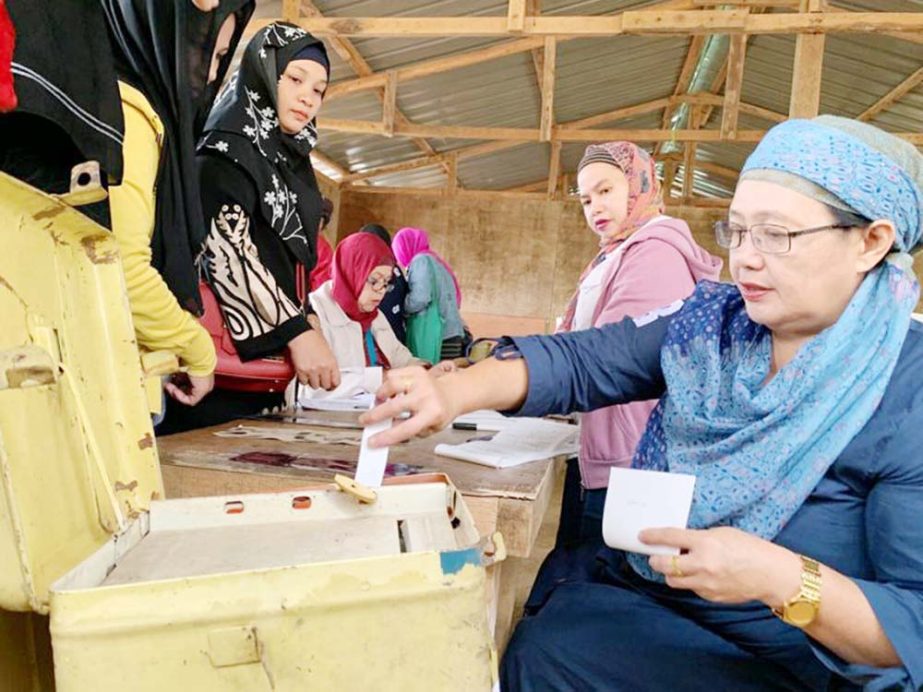
AP, Manila, Philippines :
Muslims in the southern Philippines overwhelmingly approved in a referendum the creation of a new autonomous region in hopes of ending nearly half a century of unrest, election officials said.
The Commission on Elections announced late Friday that the Bangsamoro Autonomous Region in Muslim Mindanao is deemed ratified following a referendum on Monday. It says 1.5 million people voted in favor.
Bangsamoro replaces an existing poverty-wracked autonomous region with a larger, better-funded and more powerful entity.
It is the result of a tumultuous peace effort by the government in Manila and the Moro Islamic Liberation Front, the main Muslim rebel group, to seal a deal that was signed in 2014 but languished in the Philippine Congress until it was finally approved last year. Bloodshed including the siege of Marawi city by Islamic State-linked militants and other bombings and attacks in the south threatened to derail it.
Commissioner Susana Anayatin of the Bangsamoro Transition Commission said that the ratification of the autonomy law “marks the beginning of a new government and another journey toward peace.”
Under the deal, the rebels gave up their goal of an independent state in the majority Christian Philippines in exchange for broad autonomy, although they originally wanted a federal unit with more powers. Their 30,000 to 40,000 fighters are to be demobilized. A regional parliament will be in charge of day-to-day affairs.
Al Haj Murad Ebrahim, chairman of the Moro rebels, has appealed to the international community to contribute to a trust fund to be used to finance the insurgents’ transition from decades of waging one of Asia’s longest rebellions.
Western governments have welcomed the autonomy pact. They worry that small numbers of IS-linked militants from the Middle East and Southeast Asia could forge an alliance with Filipino insurgents and turn the south into a breeding ground for extremists.
Not all Muslim-dominated areas voted in favor of the new autonomy. Sulu province, the base of a rival rebel faction, rejected it.
A second referendum on Feb. 6 will ask residents of Lanao del Norte province and seven towns in North Cotabato province with a sizeable Muslim population to decide whether they want to join the new region as well.
In 2017, Philippine troops backed by U.S. and Australian surveillance aircraft routed the militants who occupied Marawi for five months in battles that left more than 1,200 people, mostly Islamic fighters, dead and the mosque-studded city in ruins. Overall, the conflict has left about 150,000 people dead over several decades and stunted development in the resource-rich but underdeveloped southern region that is the country’s poorest
“The national government should ensure that this ratification will strengthen institutions that will bring economic growth in the newly formed region,” Vice President Leni Robredo said Friday in a statement after the release of the official results.
The affirmative vote will help spur growth in the southern Mindanao island-which has seen four decades of armed conflict-through agriculture and tourism, Economic Planning Secretary Ernesto Pernia said. Infrastructure projects worth 22.15 billion pesos ($421 million) are lined up for the region this year, he added.
President Rodrigo Duterte, who won on a platform of developing the nation’s south, said Wednesday that he was “very happy” with the plebiscite’s results as it brings Mindanao “a step nearer to peace.” He now has to appoint an interim government for the region composed of 80 officials, who will serve until the national elections in 2022.
A ballot will now be held on Feb. 6 to ask several other areas if they want to join.
The central government will oversee defense, security, and foreign and monetary policy, and soon appoint a transition authority nominated by the Moro Islamic Liberation Front
Vice President Leni Robredo said it was vital the central government helps Bangsamoro to build “a progressive economy and responsible local government”.
“Let us guard and support the progress of this process because this is not yet the end of the fight for peace,” Robredo said.
The vote came at a critical time for the Philippines, which saw disillusioned MILF factions break away and follow other armed groups in pledging allegiance to Islamic State.
That has stoked fears that fighters fleeing Iraq and Syria would join radicals from Malaysia and Indonesia in gravitating to Mindanao to capitalize on porous borders, jungles and mountains, and an abundance of arms.
Martial law has been in place in Mindanao since an extremist alliance overran Marawi City in 2017 and occupied it for five months, in what was the Philippines’ fiercest and longest conflict since World War Two.
The army said three remnants of that alliance were killed on Thursday when troops discovered a makeshift jungle camp. It released images of trenches and what it said was Islamic State paraphernalia.

